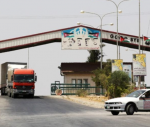You are here
‘Balfour Declaration: an ongoing process of injustice for Palestinians’
By Andrea Celeste - Oct 30,2017 - Last updated at Oct 30,2017
AMMAN — On the occasion of the centenary of the Balfour Declaration, marked on November 2, a conference titled “One Hundred Years of the Balfour Declaration: An Ongoing Palestinian Tragedy” was held at the Columbia Global Centre Amman on Sunday.
The lecture, given by Palestinian scholar Ghada Karmi, was part of a workshop titled “Where now for the Palestinian Right of Return: Theoretical right of concrete objective?”, which sought to address what the Balfour Declaration was, the reasons behind its creation and its various effects.
“It was a letter, not a binding legal document. It did not have any legal force,” Karmi said, noting that it was written by British foreign secretary Arthur Balfour to lord Rothschild, a Zionist leader in Britain.
The declaration, and the way that it was implemented later, “started a chain of events that were catastrophic for the Palestinian people”, Karmi explained, adding that “it was not something that only happened in the past; it is an ongoing process of injustice for the Palestinian people”.
The conference was discussed based on the reissued book “Palestine: The Reality” in 1939 by journalist J.M.N Jeffries, which contains a detailed analysis of the declaration and the events surrounding it.
The scholar said that the letter was written by 20 Zionists, and the word “state” was initially used in its first draft. Karmi asked: “Why did Arthur Balfour do this? Why did the British government agree to this deal, knowing what the Zionists wanted a state from the very beginning?”
In order to understand the “complex situation” surrounding the declaration, Karmi encouraged the audience to “try and put [themselves] in the mind set of 1917”, when the British government was the “largest empire the world had ever seen”.
The Palestinian scholar said that “pure imperialism”, the expansion of their political control in the region and the belief in the influence of the Jewish communities, were some reasons that contributed to the agreement.
What happened next “is a very sad story”, Karmi said, noting that the British acquired the mandate in 1933 and “they inserted this letter into the mandate, which determined the way they were going to rule”.
Karmi listed its consequences: the refugee problem (the dispossession of Palestinian people), numerous Arab-Israeli wars, the geographic shrinking of Palestine, the division of the Palestinian people fragmented into communities under occupation and the Gaza’s conflict in 2014.
The disposition and ethnic cleansing of Palestine in 1948 was the most serious and long lasting consequence of the Balfour Declaration, according to Karmi and the resulting consequences are “everywhere”. She added: “everywhere we see evidence of a people who lost their land and they are never allowed to return”.
“The right to return is as important and crucial today, as it was in 1948. We must never forget it; if we forget it we forget our whole cause.”
Related Articles
AMMAN — The Lower House on Sunday called on the UK to officially apologise to the Palestinian people for its role in signing the Balfour&nbs
AMMAN — Senate President Faisal Fayez on Sunday called on the international community to bear its legal and moral responsibilities to suppor
AMMAN —The press in Jordan on Thursday suspended work for an hour to express its continued condemnation of the Balfour Declaration, where Br















